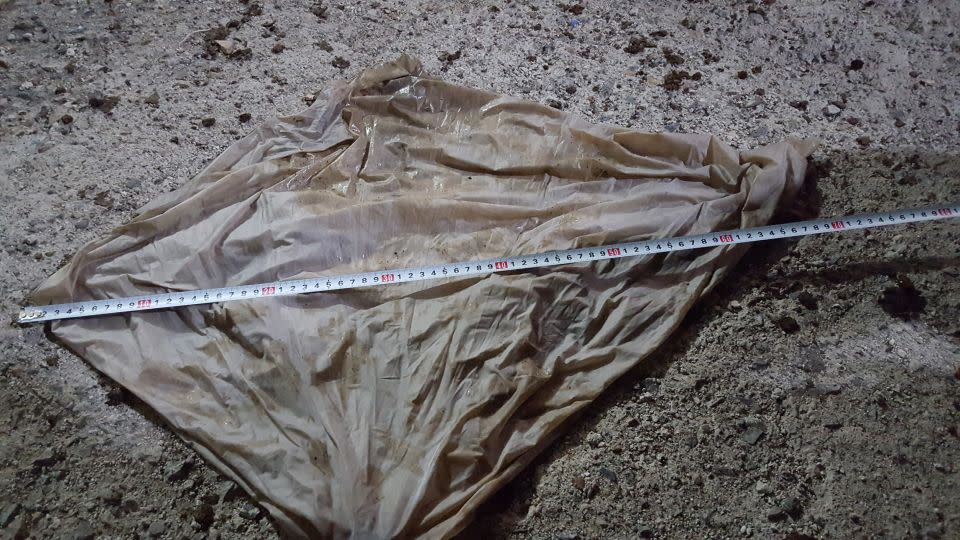North Korean trash balloons are dumping ‘filth’ on South Korea
North Korea has adopted a new strategy to contend with its southern neighbor: sending floating bags of trash containing “filth” across the border, carried by massive balloons.
The South Korean military began noticing “large amounts of balloons” arriving from the North starting Tuesday night, detecting more than 150 as of Wednesday morning, according to the country’s Joint Chiefs of Staff (JCS).
Photos released by the JCS show plastic bags carried by two giant balloons, with some broken packages spilling scraps of plastic, sheets of paper, and what appears to be dirt onto roads and sidewalks.
The balloons so far contain “filth and garbage” and are being analyzed by government agencies, said the JCS, adding that the military was cooperating with the United Nations Command.

“North Korea’s actions clearly violate international law and seriously threaten the safety of our citizens,” it added. “All responsibility arising from the North Korean balloons lies entirely with North Korea, and we sternly warn North Korea to immediately stop its inhumane and low-level actions.”
Local governments also sent messages to residents in the northern Gyeonggi and Gangwon provinces to warn of the “unidentified objects,” and advised against outdoor activities. The packages risk damaging residential areas, airports and highways, said the JCS.
North Korean leader Kim Jong Un’s younger sister Kim Yo Jong – who is also a senior official in the reclusive regime – referred to the activities as “freedom of expression.”
In a statement published by state-run Korean Central News Agency (KCNA) on Wednesday, Kim said that North Korea had dispersed toilet paper and other waste materials in bags attached to the balloons along the Korean border and central areas.
Kim compared North Korea’s actions to South Korea’s years-long practice of sending balloons with anti-North Korea leaflets towards her nation.
“We’ve done some of the things they always do, but I don’t know why they’re making a big deal like they’ve been hit by a shower of fire,” Kim said.
The move, according to North Korean state media KCNA, was to retaliate against South Korean activists who often send materials to the North – including propaganda leaflets, food, medicine, radios and USB sticks containing South Korean news and television dramas, all prohibited in the isolated totalitarian dictatorship.
Campaigners in the South, including defectors from North Korea, have long sent these materials through balloons, drones, and bottles floating down the cross-border river – even after South Korea’s parliament banned such actions in 2020.
“Scattering leaflets by use of balloons is a dangerous provocation that can be utilized for a specific military purpose,” said Kim Kang Il, North Korea’s Vice Minister of National Defense, KCNA reported on Sunday.
He accused South Korea of using “psychological warfare” by scattering “various dirty things” near border areas, declaring that the North would take “tit for tat action.”

“Mounds of wastepaper and filth will soon be scattered over the border areas and the interior of (South Korea) and it will directly experience how much effort is required to remove them,” Kim said, according to KCNA. “When our national sovereignty, security and interests are violated, we will take action immediately.”
Kim also decried joint US-South Korea military drills, which have increased in recent years as tensions have risen in the Korean peninsula.
The 2020 law that prohibited sending leaflets also restricted loudspeaker propaganda broadcasts, which the South’s military once championed as part of psychological warfare against the North until it withdrew the equipment following a 2018 summit between the two Koreas.
But even after parliament passed the ban, activists told Reuters they planned to continue – including the defector Park Sang-hak, who had been sending materials back to his homeland for 15 years, vowing to continue in an effort to give North Koreans a rare glimpse of the outside world.
Earlier this month, Park’s organization Fighters for a Free North Korea said in a statement it had sent 20 balloons toward North Korea, containing 300,000 leaflets that condemned Kim Jong Un and 2,000 USB sticks containing K-pop and music videos.
“In order to appeal and urge the North Korean people to rise up and put an end to Kim Jong Un … the group is sending the leaflets to the compatriots in North Korea,” the organization said in a statement.
For decades, North Korea has been almost completely closed off from the rest of the world, with tight control over what information gets in or out. Foreign materials including movies and books are banned, with only a few state-sanctioned exceptions; those caught with foreign contraband often face severe punishment, defectors say.
Earlier this year a South Korean research group has released rare footage that it claimed showed North Korean teenagers sentenced to hard labor for watching and distributing K-dramas.
Restrictions softened somewhat in recent decades as North Korea’s relationship with China expanded. Tentative steps to open up allowed some South Korean elements, including parts of its pop culture, to seep into the hermit nation – especially in 2017 and 2018, when relations thawed between the two countries.
But the situation in North Korea deteriorated in the following years and diplomatic talks fell apart – prompting strict rules to snap back into place in the North.
For more CNN news and newsletters create an account at CNN.com

 Yahoo News
Yahoo News 

